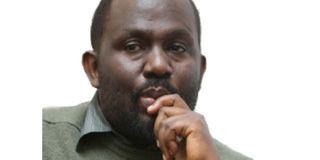Obasanjo letter’ to Museveni and Africa’s President-For-Life Club

More pathetic stories about Zimbabwe-wrecker Robert Mugabe continue to come out, after the army and his ruling Zanu-PF forced him to resign as president last week after nearly 40 years in power.
You would think that frail, and at age 94, Mugabe would have been more willing to accept his fate, but no. It has emerged that he broke down and wept uncontrollably when the end came.
He was so desperate to cling to power that he offered to exile his disagreeable wife Grace – the very woman he had tried to manoeuvre into a position to succeed him, and thus caused the coup against him. Yet, there was Mugabe throwing her under the bus.
In Uganda, meanwhile, our own good Yoweri Museveni is following in the footsteps of Mugabe, and continues to do his president-for-life dance, after nearly 32 years in State House.
Museveni looks set to equal, or beat the record of Buganda’s Kabaka Cwa II, the longest ruling king anywhere in what is today Uganda, since some reasonably good records started being kept in the late 1300s. Cwa was on the throne for 42 years.
Inevitably we have to again ask the question we have asked a million times before: What is it about the African presidency that many leaders find so hard to leave?
It would have been fine if Mugabe no longer loved Grace, but apparently he did, and was willing to do everything to enable her succeed him, despite the popular view that she was easily the most unqualified Zimbabwean for the job. But as soon as he had to choose between her and his office, he traded her for the big chair.
One school of thought holds that (in addition to fearing prosecution for their sins) life after the presidency is too miserable for African leaders, and they become “nothing”. So those that cannot find something meaty to do were they to retire, cling on.
Well, Nelson Mandela became possibly more revered after he retired. Who can forget all those global supermodels and celebrities crying with emotion just being in Madiba’s presence?
In the drama of presidents changing constitutions so they can rule forever (and now Mugabe’s fall), we did not pay sufficient attention to a powerful counter-development elsewhere in Africa – Nigeria to be precise.
In March, the Olusegun Obasanjo Presidential Library, founded by former president Olusegun Obasanjo, opened not in Lagos or Abuja, but Abeokuta, in his home Ogun State.
Now we know how these things go. You’d think it was not a library but a tiny little in his village. You’d be wrong.
It is a massive affair, developed over nearly 10 years as an archive and academic centre. It houses documents and archival materials, including the former president’s primary school uniform, shoes, military uniform, his first car and other personal belongings. It holds a mind-blowing, by African standards, 42 million books! Now it has also become a tourist attraction.
Obasanjo is serious like that. In 2014 when he published his memoirs, My Watch, we in the media focused a lot on how he had dissed (then) president Goodluck Jonathan.
A friend in Lagos then couriered me a copy. When it arrived, there were three copies. I was wondering why he had sent me three, when I noticed that they were actually three volumes! There we were fidgeting to write our first serious books, and an 80-year-old former general had thrown down a three-volume set.
Post-State House life has been good to Obasanjo – and folks like former South African president Thabo Mbeki, Mozambique’s Joachim Chissano, Tanzania’s Benjamin Mkapa, Burundi’s Pierre Buyoya, to name a few.
Their cases tell us that former African presidents can still get the red carpet, police cars with sirens, and arrive late after they leave power. But that VIP treatment depends almost entirely on when and how they leave. Mugabe, for one, will not be getting invitations to speak at Davos or to sit on the Africa Progress Panel.
Strangely, then, to get power, you need to leave it when your time is up. Or to depart with grace and decorum, if you are forced out of it early as happened with Mbeki.
Google the Olusegun Obasanjo Presidential Library, and look at the photos, if you not minded to read about it. You will like what you see.
Obasanjo did something no African leader – and indeed very few in the rest of the world - has done. He has moved from being a subject of the Nigerian story, to shaping in very fundamental ways how future generations study it, and what they study about it.
Me thinks that is more power than he had as a president. It was too late for Mugabe. Hopefully, Museveni still has Obasanjo’s number. He could learn a thing or two.
Mr Onyango-Obbo is the publisher of Africa data
visualiser Africapedia.com and explainer site Roguechiefs.com.
Twitter@cobbo3




